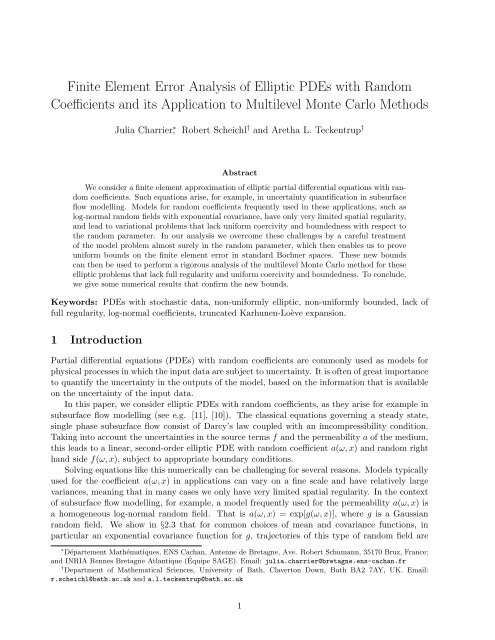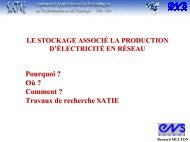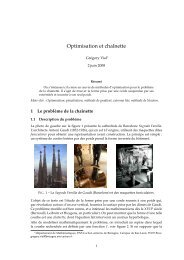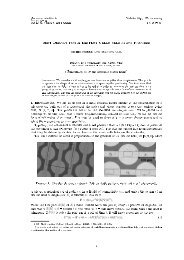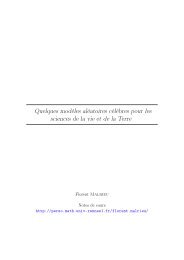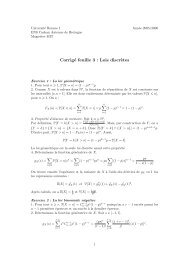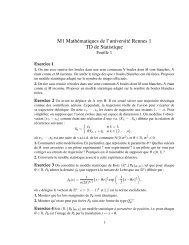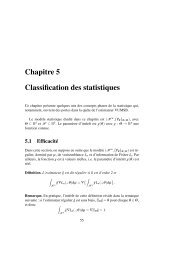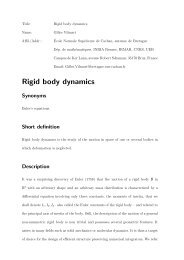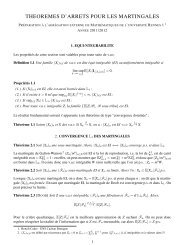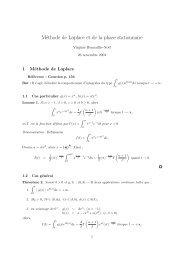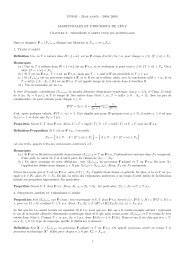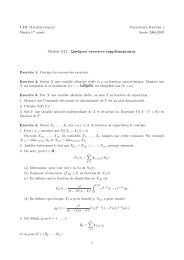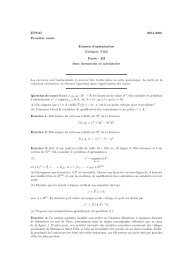Finite Element Error Analysis of Elliptic PDEs with RandomCoefficients and its Application to Multilevel Monte Carlo MethodsJulia Charrier ∗ , Robert Scheichl † and Aretha L. Teckentrup †AbstractWe consi<strong>de</strong>r a finite element approximation of elliptic partial differential equations with randomcoefficients. Such equations arise, for example, in uncertainty quantification in subsurfaceflow mo<strong>de</strong>lling. Mo<strong>de</strong>ls for random coefficients frequently used in these applications, such aslog-normal random fields with exponential covariance, have only very limited spatial regularity,and lead to variational problems that lack uniform coercivity and boun<strong>de</strong>dness with respect tothe random parameter. In our analysis we overcome these challenges by a careful treatmentof the mo<strong>de</strong>l problem almost surely in the random parameter, which then enables us to proveuniform bounds on the finite element error in standard Bochner spaces. These new boundscan then be used to perform a rigorous analysis of the multilevel Monte Carlo method for theseelliptic problems that lack full regularity and uniform coercivity and boun<strong>de</strong>dness. To conclu<strong>de</strong>,we give some numerical results that confirm the new bounds.Keywords: PDEs with stochastic data, non-uniformly elliptic, non-uniformly boun<strong>de</strong>d, lack offull regularity, log-normal coefficients, truncated Karhunen-Loève expansion.1 IntroductionPartial differential equations (PDEs) with random coefficients are commonly used as mo<strong>de</strong>ls forphysical processes in which the input data are subject to uncertainty. It is often of great importanceto quantify the uncertainty in the outputs of the mo<strong>de</strong>l, based on the information that is availableon the uncertainty of the input data.In this paper, we consi<strong>de</strong>r elliptic PDEs with random coefficients, as they arise for example insubsurface flow mo<strong>de</strong>lling (see e.g. [11], [10]). The classical equations governing a steady state,single phase subsurface flow consist of Darcy’s law coupled with an imcompressibility condition.Taking into account the uncertainties in the source terms f and the permeability a of the medium,this leads to a linear, second-or<strong>de</strong>r elliptic PDE with random coefficient a(ω, x) and random righthand si<strong>de</strong> f(ω, x), subject to appropriate boundary conditions.Solving equations like this numerically can be challenging for several reasons. Mo<strong>de</strong>ls typicallyused for the coefficient a(ω, x) in applications can vary on a fine scale and have relatively largevariances, meaning that in many cases we only have very limited spatial regularity. In the contextof subsurface flow mo<strong>de</strong>lling, for example, a mo<strong>de</strong>l frequently used for the permeability a(ω, x) isa homogeneous log-normal random field. That is a(ω, x) = exp[g(ω, x)], where g is a Gaussianrandom field. We show in §2.3 that for common choices of mean and covariance functions, inparticular an exponential covariance function for g, trajectories of this type of random field are∗ Département Mathématiques, <strong>ENS</strong> <strong>Cachan</strong>, <strong>Antenne</strong> <strong>de</strong> Bretagne, Ave. Robert Schumann, 35170 Bruz, France;and INRIA Rennes Bretagne Atlantique (Équipe SAGE). Email: julia.charrier@bretagne.ens-cachan.fr† Department of Mathematical Sciences, University of <strong>Bath</strong>, Claverton Down, <strong>Bath</strong> BA2 7AY, UK. Email:r.scheichl@bath.ac.uk and a.l.teckentrup@bath.ac.uk1
only Höl<strong>de</strong>r continuous with exponent less than 1/2. Another difficulty sometimes associated withPDEs with random coefficients, is that the coefficients cannot be boun<strong>de</strong>d uniformly in the randomparameter ω. In the worst case, this leads to elliptic differential operators which are not uniformlycoercive or uniformly boun<strong>de</strong>d. This is for example true for log-normal random fields a(ω, x). Dueto the nature of Gaussian random variables, a(ω, x) can in this case not be boun<strong>de</strong>d from aboveor away from zero uniformly in ω. It is, however, possible to bound a(ω, x) for each fixed ω.In this paper, we consi<strong>de</strong>r a finite element approximation (in space) of elliptic PDEs withrandom coefficients as <strong>de</strong>scribed above, with particular focus on the cases where the coefficienta(ω, x) can not be boun<strong>de</strong>d from above or away from zero uniformly in ω, and trajectories ofa(ω, x) are only Höl<strong>de</strong>r continuous. In<strong>de</strong>ed, if one assumes that the random coefficient a(ω, x)is sufficiently regular and can be boun<strong>de</strong>d from above and away from zero uniformly in ω, theresulting variational problem is uniformly coercive and boun<strong>de</strong>d, and the well-posedness of theproblem and the subsequent error analysis are classical, see eg. [2, 12, 1, 3]. We here <strong>de</strong>rivebounds on the finite element error in the solution in both L p (H0 1(D)) and Lp (L 2 (D)) norms. Ourerror estimate crucially makes use of the observation that for each fixed ω, we have a uniformlycoercive and boun<strong>de</strong>d problem (in x). The <strong>de</strong>rivation of the error estimate is then based onan elliptic regularity result for coefficients supposed to be only Höl<strong>de</strong>r continuous, making the<strong>de</strong>pen<strong>de</strong>nce of all constants on a(ω, x) explicit. We emphasise that we work in standard Bochnerspaces with the usual test and trial spaces as in the <strong>de</strong>terministic setting. As such, our workbuilds on and complements [13, 5, 17, 9] which all are concerned with the well-posedness andnumerical approximation of elliptic PDEs with infinite dimensional stochastic coefficients that arenot uniformly boun<strong>de</strong>d from above and below (e.g. log-normal coefficients).Finally, applying the new finite element error bounds, we quantify the error committed in themultilevel Monte Carlo (MLMC) method. The MLMC analysis is motivated by [7], where theauthors recently <strong>de</strong>monstrated numerically the effectiveness of MLMC estimators for computingmoments of various quantities of interest related to the solution u(ω, x) of an elliptic PDE withlog-normal random coefficients. The MLMC method is a very efficient variance reduction techniquefor classical Monte Carlo, especially in the context of differential equations with stochastic dataand stochastic differential equations. It was first introduced by Heinrich [19] for the computationof high-dimensional, parameter-<strong>de</strong>pen<strong>de</strong>nt integrals, and has been analysed extensively by Giles[16, 15] in the context of stochastic differential equations in mathematical finance. Un<strong>de</strong>r theassumptions of uniform coercivity and boun<strong>de</strong>dness, as well as full regularity, convergence resultsfor the MLMC estimator for elliptic PDEs with random coefficients have recently also been provedin [3]. Here we consi<strong>de</strong>r the problem without these assumptions which is of particular interest insubsurface flow applications, where log-normal coefficients are most commonly used.The outline of the rest of this paper is as follows. In §2, we present our mo<strong>de</strong>l problemand assumptions, and recall from [5], the main results on the error resulting from truncatingthe Karhunen-Loéve expansion in the context of log-normal coefficients. §3 is <strong>de</strong>voted to theestablishment of the finite element error bound. We first prove a regularity result for elliptic PDEswith Höl<strong>de</strong>r continuous coefficients, making explicit the <strong>de</strong>pen<strong>de</strong>nce of the bound on ω. The fullproof is given in the appendix. From this regularity result we then <strong>de</strong>duce the finite element errorbound in the H 1 -seminorm, before also treating the case of the L 2 -norm and the contribution ofthe quadrature error. We also improve the bound given in [5] for the finite element error in the caseof truncated KL-expansions of log-normal random fields, ensuring uniformity in K (the numberof terms of the truncated expansion). In §4, we use the finite element error analysis from §3 tofurnish a complete error analysis of the multilevel Monte Carlo method. To begin with, we presentbriefly the multilevel Monte-Carlo method for elliptic PDEs with random coefficients proposed in[7], before providing a rigorous bound for the ε-cost. Finally, in §5 we present some numericalexperiments, illustrating the sharpness of some of the results.2


